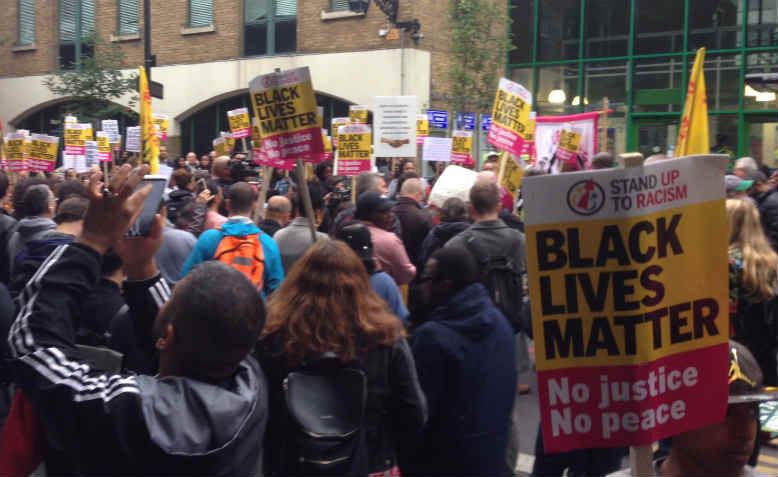 Vigil for Rashan Charles on 24 July. Photo: Counterfire
Vigil for Rashan Charles on 24 July. Photo: Counterfire
The protests that erupted after the death of Rashan Charles were a direct response to police violence
Rage against institutionalised police racism erupted onto the streets of Hackney on Friday night as clashes broke out between police and demonstrators demanding justice for the recent death of Rashan Charles in police custody.
According to police, Charles died in hospital an hour after being apprehended in Dalston, where he was ‘attempting to swallow an object.’ But CCTV footage of Rashan, unresponsive after he was body-slammed and restrained by police, suggested a different story.
Tensions reached boiling point on Friday night, following a peaceful demonstration earlier in the day, when over a hundred young protestors vented their frustration and anger at what they regard as institutionalised racism, setting fire to make-shift road blocks in Kingsland Road and hurling bottles at police. Riot police moved in at around 10.30pm to disperse the crowd as police helicopters circled the area above. There was minimal damage to property and no reported injuries.
At a #Justice4Rashan vigil outside Stoke Newington police station organised by Stand Up to Racism on Saturday, a spokesperson for the family of Rashan Charles bypassed the awaiting media and directly addressed the rioters, telling them the family understood their anger and frustration but that burning their neighbourhood was counterproductive.
He warned them that the state doesn’t care if their neighbourhoods burn – reminding them of the recent tragedy at Grenfell Tower- and that they would use the riots as an excuse to push their agenda of gentrification. He said, “The state only cares when you win the hearts and minds of the people.” Appealing to them to support the families in their struggle, he told them, “be dignified when they expect us to be wild.”
The death of Rashan Charles followed hot on the heels of a similar incident in Newham a month earlier, which resulted in the lethal detention of another unarmed black man following a traffic stop. Edson da Costa died in hospital in an induced coma after sustaining severe and multiple injuries during his apprehension by police.
Again, police claimed the suspect was attempting to ‘swallow an object.’ The insinuation is that both Charles and Da Costa were drug dealers who died attempting to swallow their stash rather than from police brutality.
Rashan’s death coincides with the news that the Police Federation are planning to survey 123,000 rank and file police officers in England and Wales on whether they would want to routinely carry a gun on patrol. The first survey of its kind in over a decade.
But a badge is not a licence to kill. The police’s duty is to protect the community they serve; to investigate and apprehend suspects. The burden of proof, sentencing and correction rests on the criminal justice system alone.
The presumption of innocence and the right to a fair trial is not only an elemental tenet of our legal system but a fundamental human right. As long as police regard more than two black males standing on a street corner as a ‘gang’ and appoint themselves judge and jury, the notion of throwing firearms into the mix is abhorrent.
Martin Luther King once said, ‘a riot is the language of the unheard.’ Power concedes nothing without demand, and protests of the kind we saw in Hackney on Friday are seldom simple manifestations of mindless violence. They are usually politically motivated.
In this instance, the protests were a direct response to police brutality and lethal detention. But they are no substitute for long-term collective opposition.

